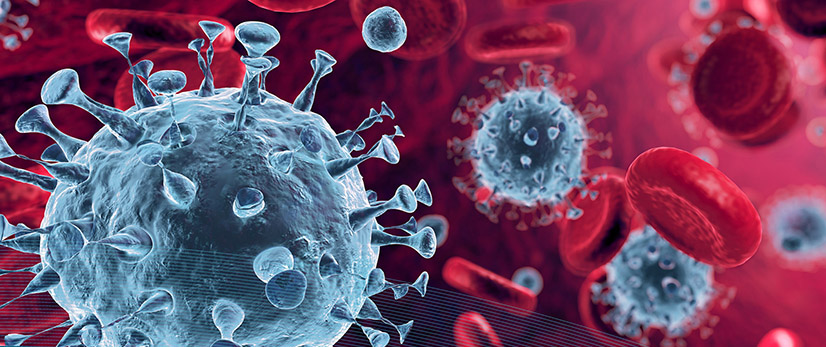UNC Researchers Find Oral Drug Promising at COVID Prevention, Treatment
Posted on Feb. 10, 2021
Scientists found that the drug — EIDD-2801 — halts SARS-CoV-2 replication and prevents infection of human cells in a new model containing human lung tissue that had been implanted into mice. (File photo)
Scientists at UNC’s School of Medicine and its Gillings School of Global Public Health have found that an orally administered experimental drug is highly effective at preventing COVID-19 infections.
They found that the drug — EIDD-2801 — halts SARS-CoV-2 replication and prevents infection of human cells in a new model containing human lung tissue that had been implanted into mice.
It also has proven effective at treating infections. Clinical trials are underway to evaluate EIDD-2801 safety in humans and its effect on viral shedding in COVID-19 patients.
Development of the drug is a response to the need for alternative treatments and preventive approaches that can be widely and rapidly implemented to curb the risk for COVID-19-related hospitalization and death in multiple settings, including nursing homes and long-term care facilities. Although vaccination is underway, that process faces logistical, manufacturing, shipping, storage, distribution and public-acceptance challenges.
Also, SARS-CoV-2 variants have emerged that appear to have increased transmissibility and have added more challenges to ensure vaccine viability.
Mouse models can be useful in studying highly pathogenic human coronaviruses, including SARS-CoV-2, and compounds that might control infection. But human coronaviruses do not replicate in mice unless researchers alter the virus, genetically modify the mice, or introduce the individual human receptor genes into mice so the virus can infect cells. Such mouse models have added to the scientific community’s understanding of coronavirus infection and disease progression, but none of these models possesses the diverse human cells found in human lungs where viral infection can cause severe disease. UNC scientists created a solution to this problem: a line of mice with human lung tissue that includes all the primary human cells infected when individuals contract COVID-19.
“We found that EIDD-2801 had a remarkable effect on virus replication after only two days of treatment — a dramatic, more than 25,000-fold reduction in the number of infectious particles in human lung tissue when treatment was initiated 24 hours post-exposure,” said senior author J. Victor Garcia-Martinez, a UNC professor of medicine and director of the International Center for the Advancement of Translational Science. Virus concentrations, he said, were reduced 96 percent when treatment was started 48 hours after exposure.
Next, the researchers tested the ability of the drug to prevent infection by administering it 12 hours prior to SARS-CoV-2 exposure and every 12 hours thereafter. They found that it significantly inhibited SARS-CoV-2 replication.
“It doesn’t have to be refrigerated; it doesn’t have to be administered in a health care setting,” Garcia-Martinez told The News & Observer. “It’s a pill.” It does not take the place of vaccines, he said. “It will not offer you long-term protection against infection,” but it could be very useful in places where infections spread rapidly and in easing the impact of illness in those who already are infected.
The drug also has implications for future coronavirus outbreaks.
“Previously, we also demonstrated that EIDD-2801 is also efficacious against SARS-CoV and MERS-CoV infection in vivo [in a living organism] and in primary human airway epithelial cultures,” said Ralph Baric, UNC’s William R. Kenan Jr. Distinguished Professor of epidemiology. “Overall, these results indicate that EIDD-2801 may not only be efficacious in treating and preventing COVID-19, it could also prove to be highly effective against future coronavirus outbreaks.”
The drug was developed at Emory University and was acquired by Ridgeback Biotherapeutics, which partnered with Merck & Co. to continue development. It currently is undergoing phase 2 and phase 3 clinical trials at Merck.
The UNC scientists published their research in the journal Nature in February.
